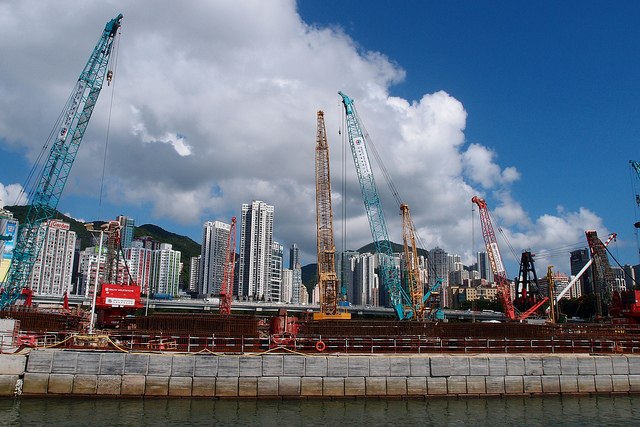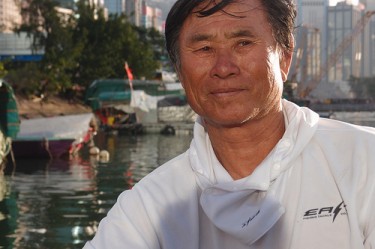“Once upon a time, Hong Kong was a fishing village,” goes the standard answer for anyone asking about Hong Kong's history. But the city is still home to a few fishermen who have witnessed the sea around Hong Kong shrink in the past few decades as officials push to expand through land reclamation, or the creation of new land from bodies of water.
Urban Diary, an online magazine in Hong Kong, recently ran an oral history feature called Fishermen's Discourse which reflects on the development of Hong Kong from the perspective of two local fishermen. The Urban Diary oral history project also comes with a short video, directed by Fredie Chan, a local independent documentary filmmaker:
Coordinator of the oral history project, Chloe Lai introduced two fishermen in the feature's foreword:
Big Lai and Yiu Gor have been fishermen for more than half a century and their families have been catching fish in Hong Kong for at least the past three generations. The two men have witnessed and are shouldering the fallout [that] land-hungry development brings to the fishing community.
I learnt from them that the top culprit behind the fast-declining fish stock is reclamation.

Sixty-year-old Big Lai still catches fish everyday. Urban Diary. Used with permission.
Sixty-year-old Big Lai was born in a fisherman's family and has been fishing ever since he learned how to walk. He never went to school but has a lot to tell from his life experience. In the interview with Urban Diary, he lamented:
Hong Kong used to be a fishing village. It seems that our government has forgotten our roots. None of their policies helps the fishing industry; in fact, they are killing us. The obsession with reclamation is especially damaging for marine ecology. Life is tough for fishermen but the rewards are low. The youngest fishermen are in their 40s; we have no new blood. There will be no more fishermen left when those from my generation retire.
Hong Kong home price is the most expensive in the world as a result of strong money flow into the property market from mainland China. As the government considers the city's property bubble as a land supply problem rather than market failure and unequal distribution of resources, the Lands Department identified 25 potential sites in Hong Kong for reclamation in 2012. If the proposal gets through, the sea will be dead. Big Lai explained the ecological impact of reclamation:
[…] reclamation creates vertical sea walls, which means the elimination of bays. Young fish and other marine creatures need the calm and safe environment of bays to grow up. Bays are essential for the sustainability of marine habitats.
In fact, more than enough environmental destruction has been done since the 1990s, as Chloe Lai pointed out in the interview:
The project to reclaim land for the airport at Chek Lap Kok alone cost over 18 km of natural coastline in the 1990s. Not long after, the Hong Kong Disneyland project reclaimed another 2.8 sq km of land off the coast of Lantau. N Big Lai doesn't go to Lantau to fish anymore.

Land Reclamation in Hong Kong. Photo from Urban Diary. Used with permission.
Unlike Big Lai who still fishes everyday, Yiu Gor had given up the career of fisherman at age 18 and became a sailor and then captain until he retired ten years ago. However, he has never given up catching fish for his own consumption. He bares witness to the decline of the fishing community in Hong Kong:
Causeway Bay Typhoon Shelter used to be a self-contained community. “You could buy fried noodles, congee, vegetables, and snakes at the typhoon shelter. Not everyone made their living from fishing. My wife's family sold water in big plastic tubs to other fishermen. There were floating restaurants where boat people held their wedding banquets. The only thing missing was clothes, so we had to go on to the land for new clothes. Some people made their living by selling groceries to big ships that were transiting in Hong Kong. They sailed out to the sea and sold food and electrical appliances to the sailors.”

Yiu Gor still spends most of his time at Causeway Bay Typhoon Shelter. Urban Diary. Used with permission.
The Hong Kong government has been encouraging fishermen to live on land rather than in the boats since the 1970s and the Causeway Bay Typhoon Shelter has slowly turned into a parking space for yachts. But some fishermen, like Yiu Gor, still want to stay close to the sea:
Although the government allocated a public rental unit to Yiu Gor and his family at Shau Kei Wan's Yiu Tung Estate in the early 1990s, he still spends most of his time in his five-metre long resting boat (one of 11 boats that he owns with his wife) at Causeway Bay typhoon shelter. He explains: “I like living in the sea. I have friends at the typhoon shelter, the air is fresher and cooler there; I can't breathe on land.”







1 comment